Education is a cornerstone of personal and national development, yet for many Nigerians, access to quality education remains a significant challenge due to financial constraints. NELFUND student loan seeks to address this critical issue by providing financial assistance to students and families in need.
As a pivotal initiative, NELFUND is designed to empower individuals by making education more accessible and affordable. Through its innovative funding solutions, the organization supports students across various academic levels, ensuring that financial limitations do not stand in the way of academic excellence and career aspirations.
In this post, we explian how to apply for the NELFUND student loan, who should apply and where to apply. Whether you’re a student seeking financial aid or an advocate for education, NELFUND’s mission resonates with all who believe in the power of learning to drive change.
Table of Contents
What is NELFUND
The Nigerian Education Loan Fund (NELFUND) is a financial initiative established to support access to education in Nigeria by providing loans to students. NELFUND was launched in May 2024, the program is designed to address the financial barriers that often hinder Nigerians from pursuing higher education and specialized courses.
By offering interest-free loans, NELFUND aims to bridge the funding gap for education, enabling individuals to achieve their academic and professional aspirations. It caters to students in universities, polytechnics, and other recognized learning institutions across Nigeria.
In addition to financial assistance, NELFUND may provide advisory services to help beneficiaries manage their funds effectively and repay loans without undue strain. This initiative aligns with Nigeria’s broader goals of improving literacy rates, fostering a skilled workforce, and driving economic growth through education.
Who should apply for the NELFUND student loan
Students must:
- Be enrolled in a Nigerian public university, polytechnic, or college of education.
- Possess a valid JAMB number and National Identification Number (NIN).
- Not have defaulted on any previous government loans.
- Maintain a satisfactory academic record during the loan period.
- Student must be a full-time student.
Please note that Part-time students are not eligible for this program.
What you need before applying for NELFUND
To register or be eligible for the NELFUND loan there are some documents that will be needed during registration they include:
- Admission letter from your institution.
- JAMB registration number.
- Bank Verification Number (BVN).
- National Identification Number (NIN).
- Institution ID card (optional)
During the registration process, you will be asked to provide those documents, some in pictorial format.
How to apply for NELFUND
Application for the NELFUND loan is straight and forward it takes just about ten (10) to fifteen (15) minutes to complete. Here’s a step-by-step process on how to apply for the NELFUND loan.
1. Login to NELFUND official website nelf.gov.ng.
2. Click on the ‘’apply now ‘’ button.

3. Scroll down and click on the ‘’get started’’ button.
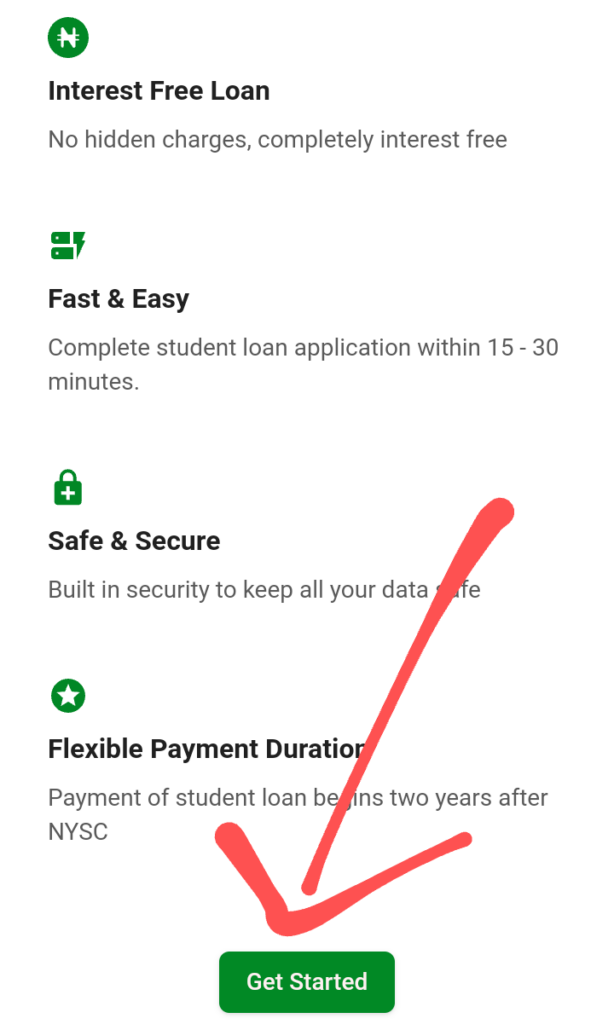
4. Click on one of the buttons if you are from Nigeria or not.
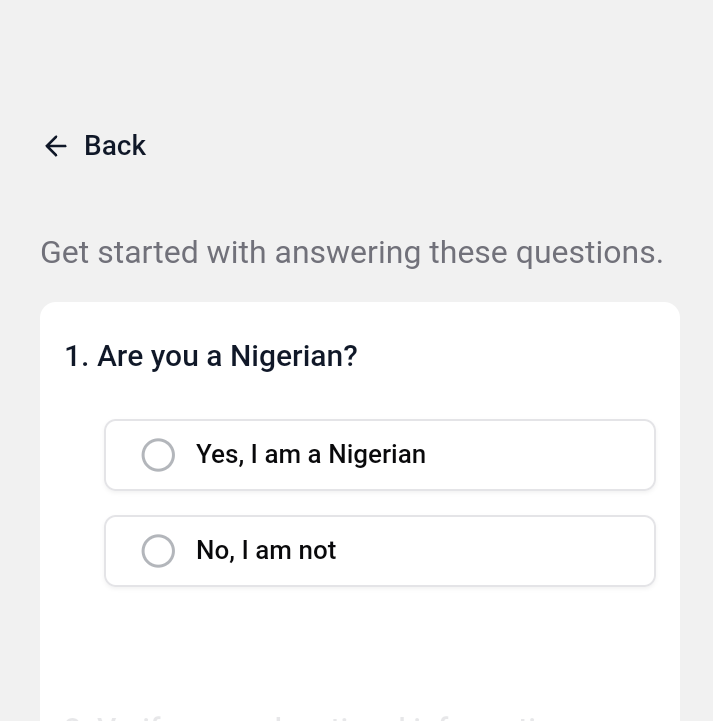
5. Verify your educational information. Select your institution and matric number.
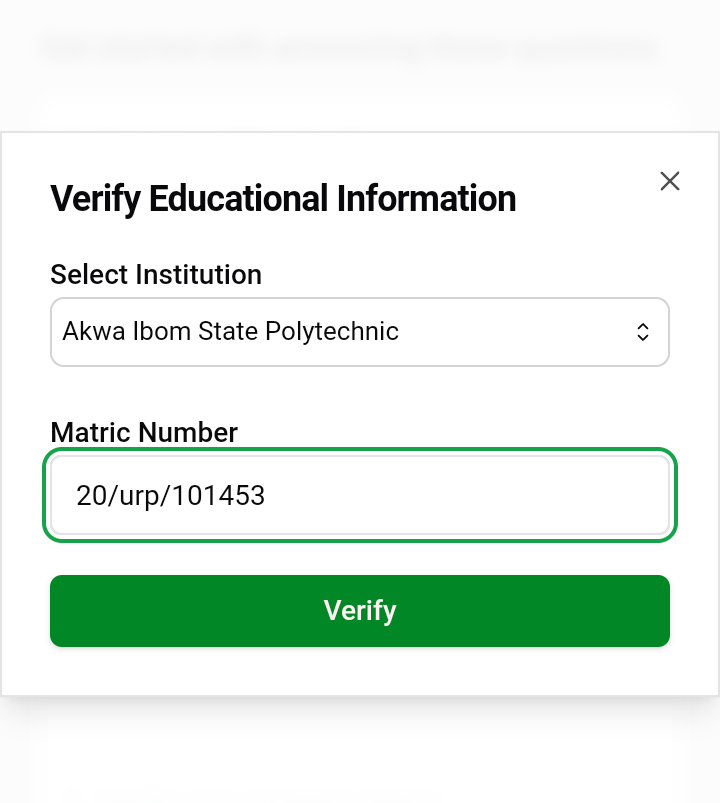
6. If your school has uploaded your information to NELFUND you should be able to see your data by now.
7. Fill in your email address, and your login password. Don’t also forget to verify your email address.
8. Fill in your contact information and home address etc.
9. Make sure you complete other information like bank account number, bank name, and phone number. Make sure you don’t make any mistakes because correction is not possible unless you contact the NELFUND support team to help you rectify it.
10. After logging into your dashboard click on ‘’request for student loan’’.
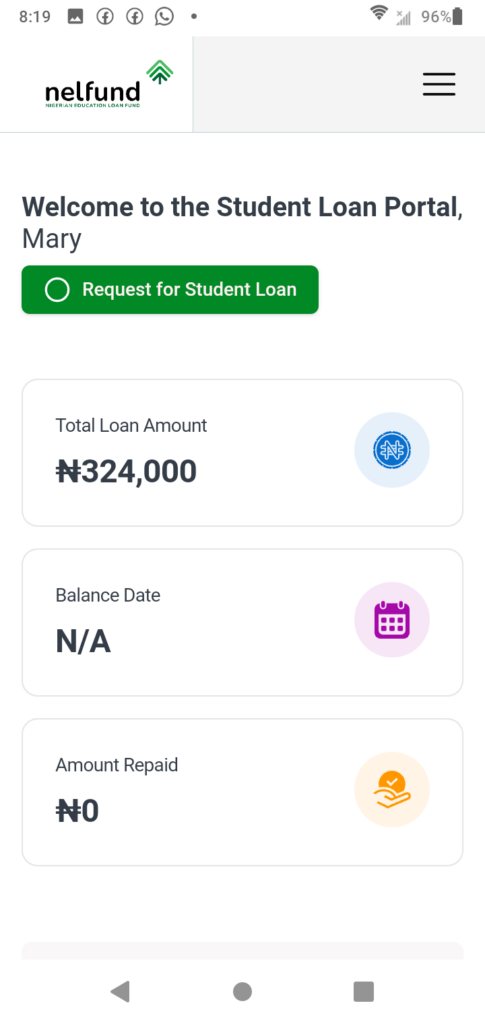
11. Select the type of loan you want (upkeep loan or school fees loan).
12. Upload your school admission letter and student ID card which is optional. Then confirm and continue.
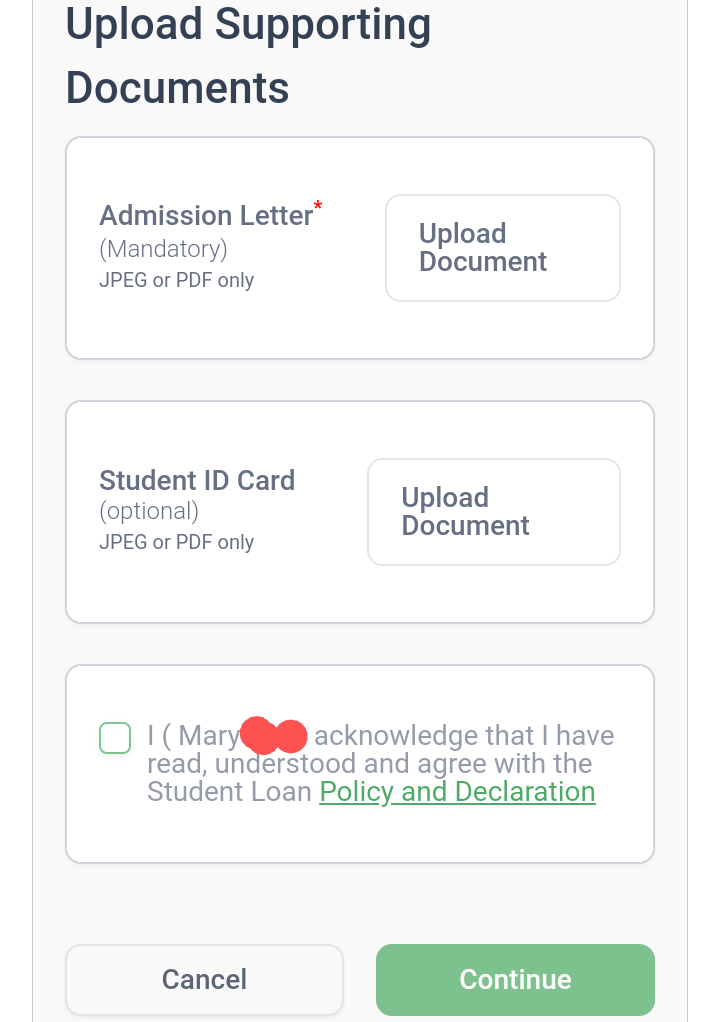
How long does it take to get your loan
Honestly, there’s no fixed date or time frame for the disbursement of the loan, this is because the application for the loan will pass through six (6) stages before disbursement of the loan
1. Data submission: Your school will need to submit your data to the NELFUND database. Information that will be submitted by your school includes; Jamb details, course of study, academic level, and cost of institution fee. This will be saved in the NELFUND database so that you can apply for the loan. Mind you if your school is yet to submit or upload your details to NELFUND you won’t be eligible for registration.
2. Inform students about the application: Your institution will inform you as a student about NELFUND in order for you to be aware of the loan so that you don’t miss out. Information may be passed out through the school WhatsApp group or the school might release a circular.
3. Student loan application: Students will need to apply for a NELFUND loan through the NELFUND portal (www.nelf.gov.ng) Students will need to provide their details as well. This includes jamb number, NIN, matric number, and Bank verification number (BVN).
4. Data verification by NELFUND: After students have submitted their information, NELUND will need to verify each of the information to check if the information provided is genuine.
5. Approval notification to the institution: After the information provided has been submitted by the student, NELFUND will compile a list of all the students in that institution who meet the criteria for application of loan. The list will be forwarded to the student institution for approval. The list looks exactly like the picture below.
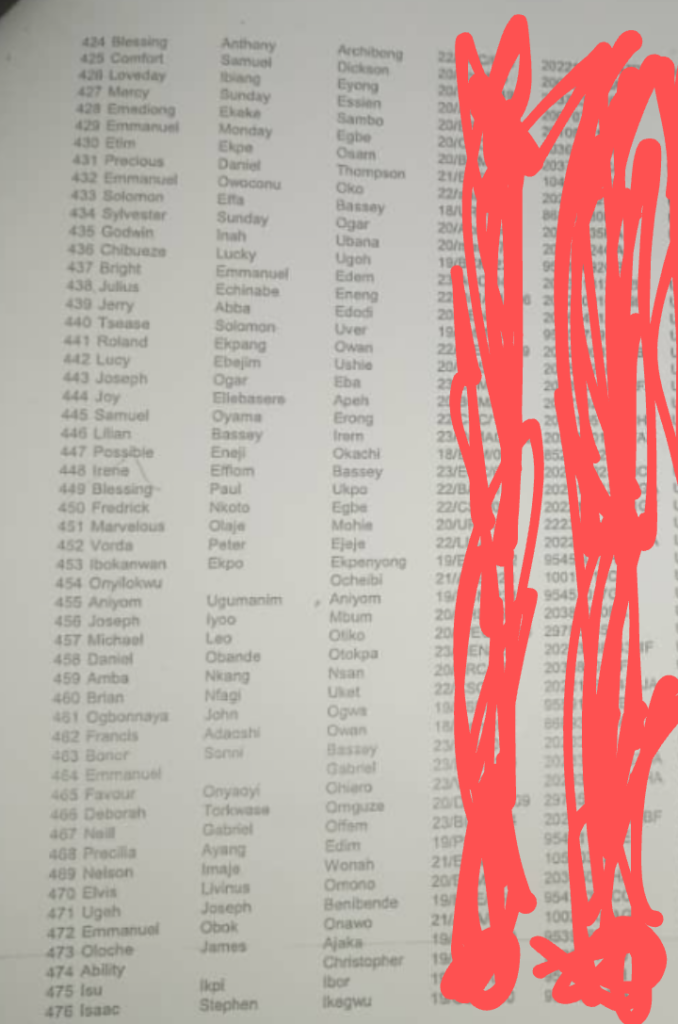
6. Institution verification: The institution will take a look at the list from NELFUND to verify if the information is authentic and theres no error. The list is then signed by the school management and returned to NELFUND for disbursement of loans.
7. Disbursement of Loans: After the school verifies the list and also sends the list back to NELFUND, NELFUND will then disburse the loan on behalf of the student. School fees go directly to the school account while upkeep goes to the student account.
I ran some analysis on the time frame for the loan to be disbursed by NELFUND and I noticed it usually stays for two (2) to six (6) months before loan disbursement. This might vary in different schools across Nigeria.
Pros of the NELFUND student loan
Zero-interest loan: Yes, the NELFUND loan is interest-free, making it easier for students to repay without additional financial burdens.
Great loan duration: You don’t need to worry much about paying back your loan now because you will be asked to pay it back after you have graduated and finished your NYSC added with two (2) years. Please note that this doesn’t mean you can’t pay your loan back if you have the money before going for your NYSC.
Twenty thousand Nigerian Naira (20,000) monthly upkeeps: If you apply for upkeeps, you will receive a maximum amount of Twenty thousand Nigerian Naira (20,000) monthly for twelve months as your upkeep. you can also apply again after the twelve (12) month duration elapse.

Cons of the NELFUND student loan
Slow approval process: The approval process is too slow, as I said earlier, your application needs to pass through these six (6) stages. Data submission, informing student applications about readiness, student loan application, application processing by NELFUND, approval notification to institutions, institutional verification, before disbursement of loan. This affected a lot of students including some of the students I registered for. The loan came late, and they relied on it so badly that some couldn’t sit for their exams. This is because the loan was still processing and the money was not there to pay for it, even if you pay for it you will end up paying double after they disburse the school fees loan for that section your institution will still accept the money and you will need to pay back to NELFUND after your NYSC.
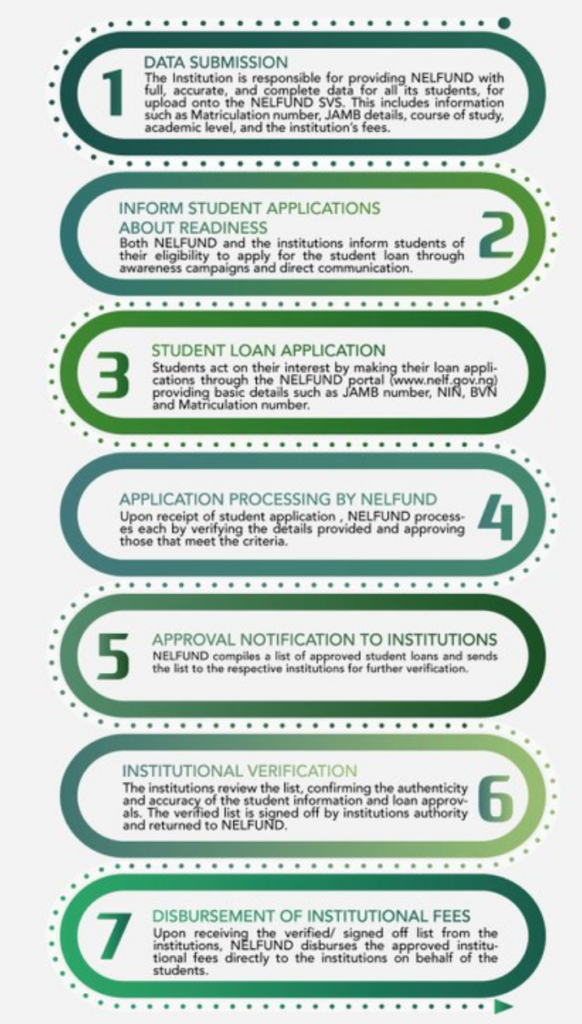
Poor support system: Okay, I feel there is a lot of work that needs to be done here, there are a lot of complaints on how to get the ‘’RRR’’ for the school fees payment and also how to cancel loans that are still pending. Some of these issues are yet to be addressed properly by NELFUND at the time of my publishing. Also, their support system is too slow to respond. I feel they need more hands in that area. It took them a long time to reply my ticket, I needed to post a screenshot of my ticket and complain bitterly about the problem on one of their posts on X before I got a reply on my NELFUND account concerning the problem.
Conclusion
The Nigerian Education Loan Fund (NELFUND) represents a monumental step toward addressing the financial barriers that have long hindered access to education in Nigeria. With its zero-interest loans, monthly upkeep allowance, and post-graduation repayment plans, NELFUND is not just alleviating the immediate financial burdens of students but also contributing to a more educated and empowered workforce.
However, like any pioneering initiative, NELFUND is not without challenges. The slow approval process and below-average support system highlight areas that require urgent improvement to ensure the fund operates efficiently and meets the needs of its beneficiaries. Addressing these issues will enhance its impact and solidify its role as a critical enabler of academic success and national growth.
For students, parents, and education advocates, NELFUND offers a beacon of hope—a chance to bridge the gap between dreams and reality. By leveraging this opportunity wisely and advocating for continuous improvements, we can collectively drive the transformative change Nigeria’s education system so desperately needs.












